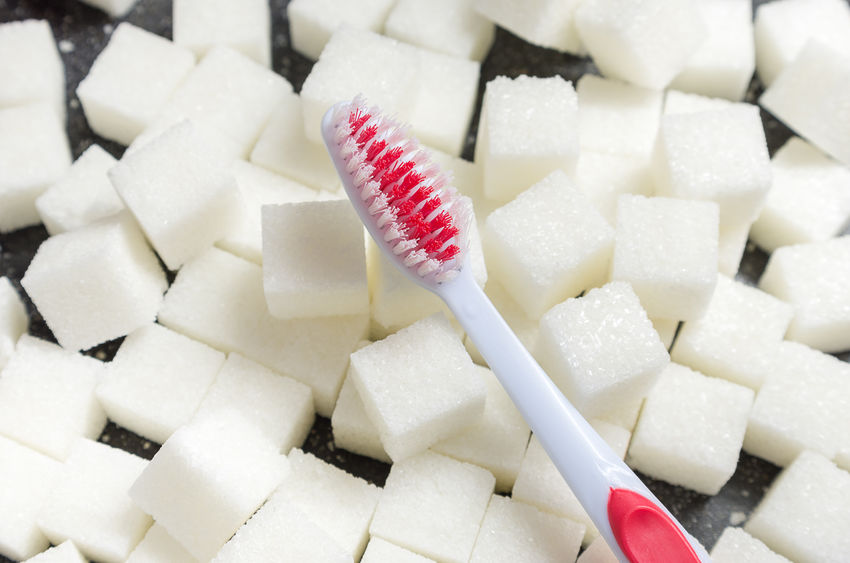
Let’s get granular about cavities. We all know what cavities are, right? Tooth decay that creates permanently damaged areas in the hard surfaces of the teeth that become tiny holes. But the more we actually know about cavities, the better job we can do at preventing them.
Did you know that cavities are one of the world’s most common health problems? According to the World Dental Federation, untreated tooth decay is an issue affecting nearly half of the world’s population. Cavities are most prevalent in children, teenagers, and older adults, but anyone with teeth is at risk of developing tooth decay.
Simply put, sugary foods cause tooth decay. So when bits of food and drink like bread, fruit, candy, milk, soda, and the like stay in contact with your teeth, they cause decay. The bacteria in your mouth turns these foods into acids, then the bacteria, acids, and food debris combine with your saliva to form plaque. This plaque clings to the surfaces of your teeth, dissolving the enamel and causing cavities to form.
Signs and symptoms of cavities often depend on where they are in your mouth and how large they are. You may not even have any symptoms at first, if the cavity is small enough, but as it gets larger, you may experience some of the following:
Everyone with teeth is susceptible to tooth decay and cavities, so it’s important to do what you can to minimize the chances of getting them with preventative care. Being aware and conscientious of habits that can affect your overall oral health can go a long way. So here are a few things that can contribute to the formation of cavities.
If you do get cavities, you’ll need to work with your Chattanooga family dentist to figure out best treatment options and preventative measures to take as you move forward. Depending on the size and location of your cavity, your dentist may suggest a basic filling made of silver alloy, porcelain, gold, or composite resin. If the tooth decay is more severe, you may be looking at a root canal and/or crown. The best way to avoid getting cavities is to brush your teeth at least twice daily with fluoride toothpaste, floss regularly, eat a healthy diet without too much intermittent snacking, and of course, see your Tedford Family Dentist regularly for cleanings and exams. Our team will work with you to help prevent tooth decay and keep you smiling!
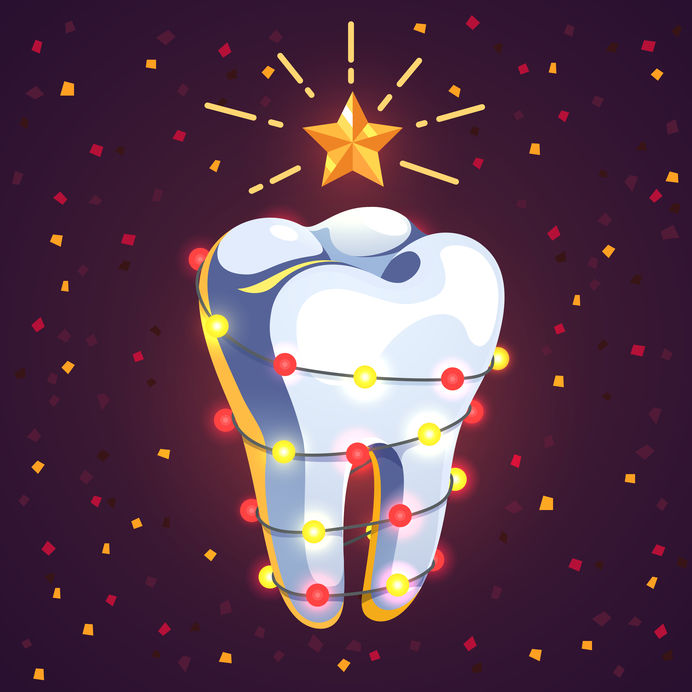
There’s a time and place for practical gifts, and our team at Tedford Family Dentistry thinks gifts that help promote better oral health are always a great way to go. So this year as you’re doing your holiday shopping, consider some of these top items from our holiday gift guide for better oral health!
It’s a little luxurious, and a little boujee, but also such a nice thing to have– the electric toothbrush. Help that loved one in your life take their brushing up a notch. With cool options like Quip or Sonicare, you could even gift your loved one an ongoing subscription for top-of-the-line dental supplies.
If you’re looking for a great stocking stuffer for your kids or significant other, consider sugar free gum to accompany all the chocolate candy this year. Chewing gum can actually have a positive impact on your dental health by stimulating your mouth’s production of saliva. Steer clear of sugary gums though, as these can promote tooth decay.
Let’s be real. Most of us don’t take flossing as seriously as we should, and could use a little extra motivation in this important department of dental hygiene. So consider giving the give of a water flosser. Water flossers use water pressure to help clean between the teeth. A lot of people prefer this method to traditional dental floss, finding it more effective and more comfortable. Waterpik® is a great brand for water flossers you can check out.
There’s nothing like the confidence boost you get from loving your own smile. So maybe this holiday season you give the gift of professional teeth whitening treatments to a loved one, or better yet– treat yourself this year! Our team at Tedford can help you achieve your best smile with our in-office whitening services.
Lots of us travel during the holidays, and it’s nice to be set up to take great care of your teeth while you’re on the go. Another great gift idea is a travel dental kit put together by hand. Select a great travel toiletry bag, and fill it with travel size toothpaste, floss, mouthwash, mints, and anything else you think fits the bill. Bonus: this person will think of you with every trip taken!
So while you’re doing your holiday shopping this year, think about how you can give the gift of a healthier smile to the ones you love the most. We hope our holiday gift guide serves as inspiration for your most practical yet loveable gifts for better oral health in the upcoming year! Cheers and happy holidays, from all of us at Tedford!

The costume-clad, candy-hunting holiday we celebrate now as Halloween was derived from an ancient Celtic festival called Samhain during which people would light bonfires, dress in costumes to ward off ghosts when the veil between the living and the dead was thought to be thinnest.
Over time, the name and customs associated with the holiday have evolved to include jack-o-lantern carving, scary movie viewing, and trick or treating around neighborhoods. But even though Halloween might be a dream for your children (who doesn’t love dressing up and eating tons of candy?), it has the potential to become your Chattanooga pediatric dentist’s nightmare. So our team at Tedford Family Dentistry has compiled a list of tips to help you keep your child’s dental health in check through the sugariest holiday on the calendar.
Know which candies are least harmful to your teeth. Dark chocolate for example is one of the better options, as it tends to have less added sugar. Furthermore, the antioxidants found in dark chocolate have been shown to fight periodontal disease. Who knew? (Well, we did, and now you do.)
Take it easy on the taffies and ultra sticky candies like Milk Duds. Sticky caramels and taffy tend to stick to the teeth, allowing the sugar therein to eat away at tooth enamel. These treats are also potentially dangerous for children with caps on their teeth, as the sticky candies can even pull off caps or crowns.
Enjoy candy at mealtimes. It’s a good idea to let your kids eat their candy and treats at mealtimes, because the saliva produced in the mouth while eating actually helps to wash away otherwise lingering sugars and bacteria.
Eat dinner before trick or treating! Trick or treat with full bellies so your kids won’t be tempted to candy binge. This will also give you time to get home and check over their stashes to ensure safety of the treats. Plus, counting and sorting the goods is half the fun!
Instate a candy budget. Don’t let your kids go crazy on the candy, but teach them moderation. Not only will the trick or treating loot last longer than a night or two, but also limiting your kids’ intake of sugar will be best for them all around. Their teeth (and tummies) will definitely thank you.
Drink lots of water. Not only does drinking water have fluoride in it, which helps preserve tooth enamel, but also the swishing water inside the mouth helps wash away bits of food and treats, as well as sugar and bacteria that can cause cavities.
Don’t forget to brush and floss. Good oral hygiene is imperative always, but especially when your child has consumed sugary treats. Leaving candy residue on teeth and gums is an invitation to decay. Brush, brush, and brush again.
Consider non-candy treats. Broaden your Halloween horizons by giving your kids something other than candy on this holiday. We’re talking glow sticks, coloring books, temporary tattoos, and maybe even a new toothbrush!
Don’t skip your cleanings! It’s really important to maintain your child’s dental cleaning and exam schedule to ensure issues are caught early– plus preventative care is always less painful and less expensive than fillings, root canals, and crowns.
Regardless of how you and yours choose to celebrate Halloween this year, we hope you have a safe and fun time. Our team at Tedford Family Dentistry wishes you the spookiest Halloween ever, and we hope you’ll take our dental tips to heart. Can’t wait to see your boo-tiful smiles soon!

When it comes to protecting your child’s teeth, the more you know, the better a job you’ll be able to do. Especially for first time parents, your knowledge about early dentistry and baby teeth may be limited, because this is a whole new adventure for you. So, here are a few things perhaps you didn’t know about baby teeth, and how you can best care for your child when it comes to oral health.
Your baby’s first tooth is a big childhood milestone. You’ll be saying ‘so long’ to that gummy grin, and you’ll likely deal with a little fussing as your baby’s teeth begin to erupt and grow in. This process can come with a little pain and irritability for your baby, as well as a low grade fever on occasion. That said, a lot more changes during this stage than the way your baby’s smile looks.
Baby teeth, also called primary teeth, serve a major purpose for your child. Those baby teeth prepare the mouth for the permanent teeth that will carry your child through adulthood. These primary teeth serve the obvious purposes– chewing and eating, but they also aid your child in speech functions, while also serving as placeholders for the permanent teeth that will eventually begin to replace them.
Keeping these baby teeth healthy as your child grows and matures will help ensure a healthier dental path for them as they approach adulthood. Proper dental hygiene and preventative dental care work in tandem to help keep your child’s teeth and mouth healthy and prevent dental problems down the road that can be both painful and costly.

Our team at Tedford Family Dentistry in Chattanooga would love to help you and your child take exceptional care of those precious primary teeth. If you need to schedule an appointment for your child, contact us today!
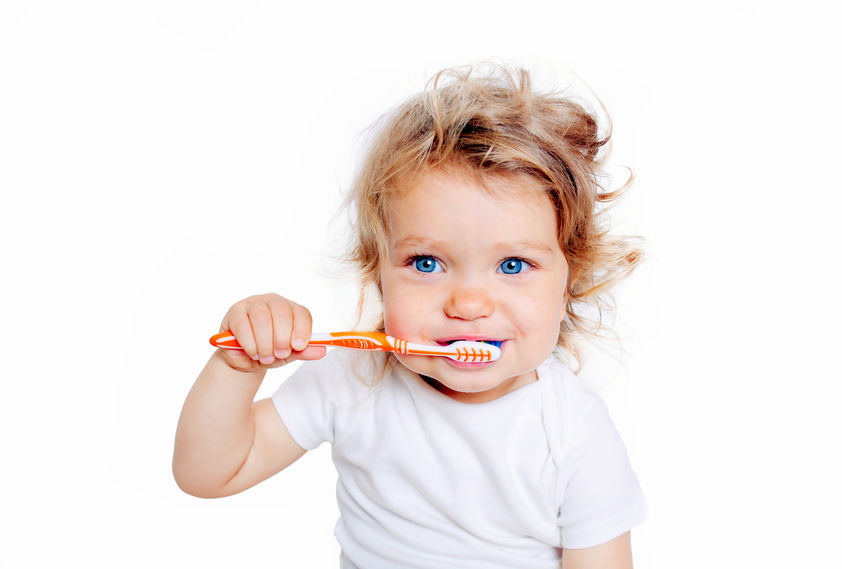
Dental care for children all comes down to routine. Having a routine can help you incorporate healthy habits for your kids, especially when it comes to dental hygiene. Summer time can be a little lax when it comes to kids though, right? Without school and normal routines, some of our structure tends to go out the window. But with school starting up again and some sense of normalcy returning to the days, you can help engrain those healthy dental habits for your kids. Chattanooga Preventative dentistry and intentional home care can culminate in a much healthier mouth.
Encourage your child to practice regular brushing and flossing As your child becomes more conscious of his or her appearance, encourage proper dental care to keep teeth healthy and looking their best Teach them about how good dental hygiene results in fresh breath If your child grinds his or her teeth at night, or plays sports, ensure they have the proper mouth guards to protect their teeth If your child wears braces, make sure he or she flosses and power brushes thoroughly to avoid spots when the braces are removed Remember to stay on top of regular cleanings and exams to avoid costly and painful dental issues
When it comes to preventative dentistry, we’ve got a few more tips for helping teach your children how to both care for their smiles at home and work closely with your family dentist.
If you are looking for exceptional dental care and preventative dentistry, come see our excellent staff at Tedford Family Dentistry in Ooltewah. We will take great care of your family!
It’s likely that your parents have taught you about the benefits of good oral hygiene since early childhood. They taught you to brush your teeth, floss daily, avoid excessive sugary food and drink, and the like. But the benefits of taking care of your teeth and gums go well beyond appearance and fresh breath. Let’s explore some of the benefits of taking exceptional care of your mouth with healthy habits!

First of all, it’s a good idea to know and understand what it really means to practice good oral hygiene. It all starts with taking great care of your teeth and gums at home.
Taking great care of your teeth and gums serves you in so many ways. Practicing good oral hygiene can also add to an improved sense of self esteem and self confidence, and all around quality of life. So take care of those pearly whites, and if you need dental assistance, know the team at Tedford Family Dentistry is here for you anytime! Feel free to reach out with any need.
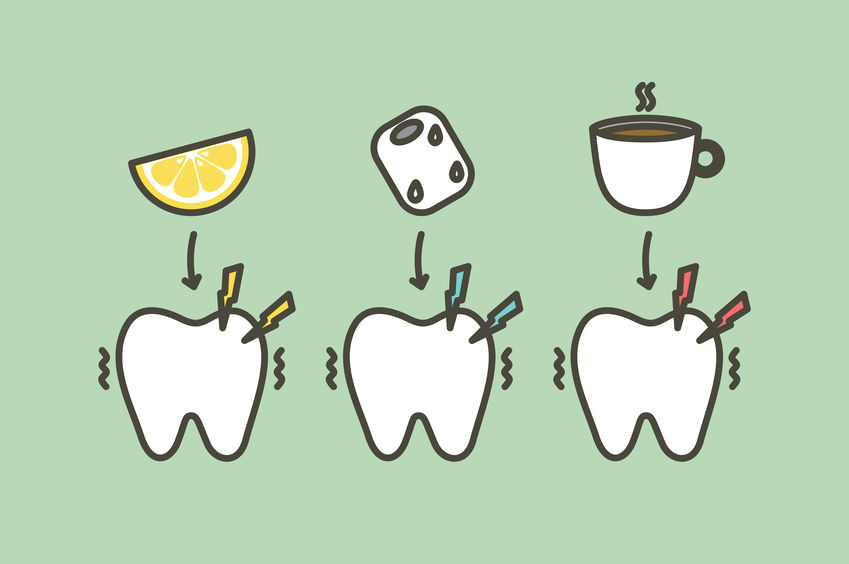
Odds are that at one point or another you’ve experienced pain or discomfort after taking a bite of fresh-from-the-freezer ice cream or a heaping spoonful of super hot soup. This sensation is linked to tooth sensitivity. Although pain caused by hot or cold food and drink can sometimes be a sign of a dental problem, your Chattanooga family dentist will also tell you it could just be the result of having sensitive teeth.
Tooth sensitivity is also known as “dentin hypersensitivity,” and can be a temporary issue or a chronic problem depending on the patient and circumstances. You may notice your teeth are sensitive to specific stimuli, like extreme temperatures. Sometimes these symptoms come and go or range in severity from mild to intense. Common triggers for tooth sensitivity include:
Some dental patients experience tooth sensitivity because of a naturally thinner layer of enamel than is common. The enamel is the outermost layer of the tooth that serves to protect it from outside elements that cause decay. Sometimes other factors cause the enamel to wear and break down over time. Such factors include:

Other factors such as gum recession, tooth decay, broken or chipped teeth, and worn down, damaged fillings or crowns can also result in exposed dentin, causing tooth sensitivity. If this is the case, you’ll likely only feel sensitivity in that one area of the mouth as opposed to a general feeling of sensitivity. Sometimes dental work can leave the teeth feeling sensitive for a few days post procedures, and whitening efforts can have a similar effect. That said, in cases such as these, symptoms tend to reside quickly.
If you are experiencing tooth sensitivity for the first time, you should make an appointment with your Chattanooga family dentist. When you have a routine dental cleaning and/or exam, your dentist can check for potential issues that could be causing your tooth pain. Cavities, recessed gums, or loose fillings could be the culprit. Regardless of the cause, your dentist can help you find relief for the sensitivity you’re experiencing via several different treatment options.
Your Chattanooga family dentist will assess your dental sensitivity, and make treatment suggestions based on what the root cause may be. For example, if you’re suffering from the symptoms of GERD, acid reducers can help treat the symptoms of that ailment, while also helping to safeguard your tooth enamel in the process. If receding gums may be the cause, your dentist may suggest you use a different type of toothbrush or methods of oral hygiene, or if severe enough, may suggest a gum graft course of treatment. Treatment may be as simple as switching the type of toothpaste or mouthwash you’re using.
No matter what the cause of your tooth sensitivity, the staff at Tedford Family Dentistry wants to help you resolve it. Contact our today to schedule an appointment. Relief is achievable, and we want to help you find it!
COVID-19 has changed our daily lives in so many ways, and social distancing or sheltering in place means we don’t have the luxury of rushing out to see our Chattanooga dentist at the first sign of a dental problem. That said, we’ve rounded up some home remedies for toothaches and other tips that might help you avoid dental disasters during these difficult times.
Not having ready access to a dentist means you should definitely pay extra attention to your regular dental hygiene habits. Be sure to make brushing your teeth and flossing a priority. It shouldn’t be an issue since we’re all spending so much extra time at home, right?
Another important thing is to make sure you’re wearing your night guard regularly if you have one. Many of us grind our teeth at night while sleeping, and suffer from bruxism, which can cause a lot of damage to otherwise healthy teeth. These issues are exacerbated in times of stress, so to all our night guard wearers, approach it religiously during these times.
All this said, if you find yourself experiencing tooth aches while you can’t be seen by a dentist, here are a few things you can try to help ease the pain until you can get the dental care you need.
This might seem like a basic step, but you’d be surprised how effective a salt water rinse can be in combating dental pain. Sometimes food particles or debris can become lodged between your teeth and cause minor infections that can be painful. As salt water is a natural disinfectant, sometimes a salt water rinse can help heal oral wounds as well as decrease inflammation in the mouth that can be the source of your discomfort. Try mixing about a half teaspoon of salt into a small glass of warm water, then swish it in your mouth a few times just like you would use a mouthwash. Spit, and repeat. Try this a few times a day to see if you can get relief from your tooth pain.
Hydrogen peroxide, like salt water, can help to relieve pain and inflammation caused by dental issues. It also kills bacteria and can help heal irritated or bleeding gums. Make sure you dilute the peroxide before using as an oral rinse. Cut the peroxide half with water, and use it as a mouthwash. Do not swallow.
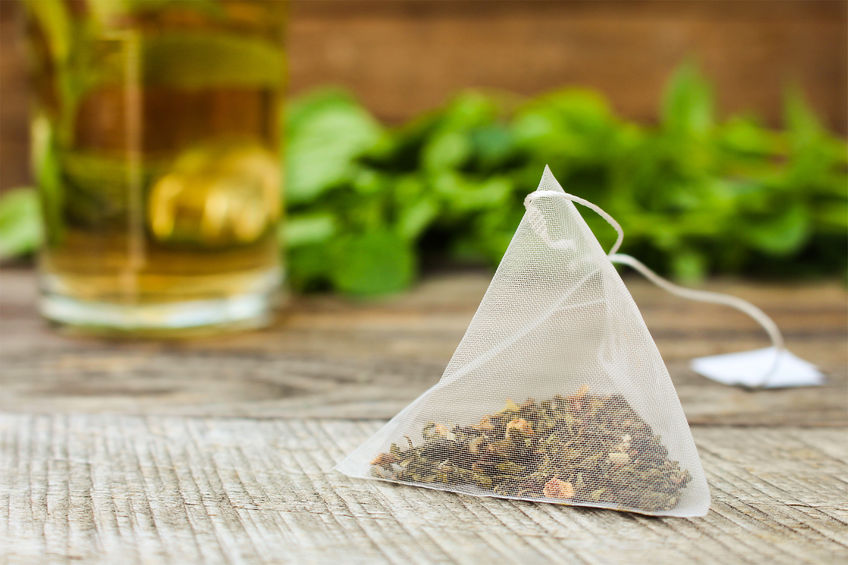
Sometimes peppermint tea bags can serve as a quick home remedy for sensitive gums. The peppermint acts almost as a numbing agent to the affected area, and offers some relief in some cases. Allow the tea bag to cool down some before applying, but it should still be somewhat warm. Peppermint actually has many health benefits, acting as a remedy for many ailments. It also kills germs in the mouth. Learn more about the benefits of peppermint through a WebMD write up here.
A cold compress is another quick home remedy for toothaches and other oral pain, especially in instances that involve trauma to the tooth. The cold compress causes the blood vessels in the area to constrict, which consequently makes the pain less severe. Cold also helps to reduce inflammation and swelling associated with the tooth issue.
Clove oil contains eugenol, which happens to be a natural antiseptic. Because it reduces inflammation and numbs pain, clove has been used throughout history to treat toothaches. Apply a small amount of clove oil to the affected area with a cotton ball or q-tip a few times daily. You can also add a drop or two of clove oil to water to make a rinse.
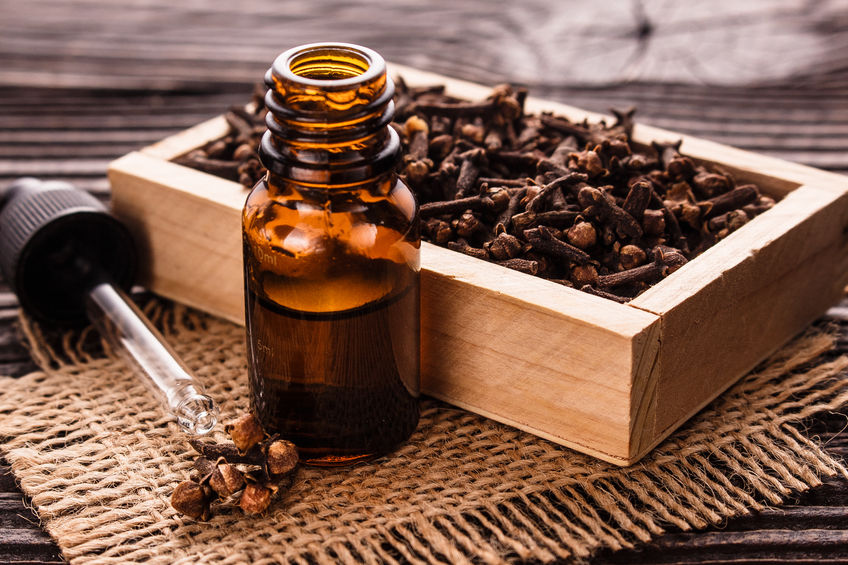
We hope these home remedies for toothaches help get you through any minor dental issues you’re experiencing while COVID-19 has you stuck at home. Many toothaches will require dental attention, but in the meantime try these methods for reducing pain. That said if your toothache is severe enough or does not subside, you will need to seek dental care.
You should also contact us if you experience fever, swelling that does not subside, pain when you bite or chew, red or visually inflamed gums, or trouble swallowing. Our team at Tedford Family Dentistry wishes health and safety for you and yours during these trying times.
Protecting your child’s teeth from decay and other problems is an important task for parents, and there’s lots of advice out there– good and bad. We all know cavities and dental problems can be both painful and costly, so working to actively avoid them for ourselves and our kids is something to approach with intention. Did you know that certain foods are great for dental health, while others can be particularly damaging? Our expert pediatric dentists at Tedford Family Dentistry in Ooltewah have compiled a list of best and worst foods for your child’s teeth, so you can stay informed and take a proactive approach to teaching your children healthy dental hygiene.

Sugary Drinks–
You guessed it! You may not be aware of just how teeth-damaging sugary drinks and sodas can be. The acids and sugars beverages like soft drinks and juices contain can really work against you causing tooth and gum damage. The sugar works as a fuel for bacteria in the mouth, turning it into an acid that eats away at tooth enamel, the outer protective layer of the teeth. Over time, this leads to tooth decay and– of course– cavities, so it’s important to try to limit your child’s intake of these types of drinks.
Sticky, Chewy Candy–
Chewy and sticky types of candy like caramels, taffy, and gummies tend to stick to the teeth for a long time. They also have a tendency to get stuck between the teeth or even leave a sugary residue behind that attacks and dissolves tooth enamel.
Chips, Pasta, & Bread–
This one may come as more of a surprise, but consuming lots of high-carb foods like chips, pasta, and bread can also have an adverse effect on tooth health. These starches are often made from white flour, which turns to simple sugars inside the body. These simple sugars can lead to tooth decay!

Milk, Cheese, & Yogurt–
Milk, cheese and yogurt are foods that are rich in calcium, phosphorus, and casein, all of which can help protect tooth enamel. Also, some of the nutrients found in milk can have a neutralizing effect on the acid that is produced by plaque bacteria in the mouth each time your child eats or drinks. So in short, not only is milk good for the bones, but it’s also great for the teeth!
Eggs–
An excellent source of protein, calcium, and vitamin D, eggs are great for oral health, as these minerals are key players in that arena. Vitamin D plays a large role in the absorption of calcium, and both of these vitamins help kids maintain strong and healthy teeth.
Apples, Carrots, & Celery–
Chewing apples, carrots, and other crunchy items that are high in fiber can actually scrub plaque off of your child’s teeth! These foods also make for healthy, easy-to-prepare snacks that are full of vitamins and minerals. Carrots and apples are also high in water content, and require a lot of chewing, which means more tooth-scrubbing action. An apple– who knew it was nature’s toothbrush!
Best and worst foods aside, it’s super important to teach your children healthy dental habits from the beginning. Show them how to properly brush their teeth, as well as floss them, and make sure they’re doing so twice a day for at least two minutes each time, per the ADA’s recommendation. If you need more advice or are looking for a great family dentist in the Chattanooga area, get in touch with Tedford Family Dentistry today!
When it comes to oral hygiene, there are many myths floating around that may cause confusion about what actually IS right, good for you, and necessary when it comes to your dental health. How often should you see your Chattanooga dentist? How many times a day should you brush your teeth and for how long? And then there’s flossing. What are the hard and fast rules about flossing your teeth? And what myths beg busting? Below are a few flossing myths your friends at Tedford Family Dentistry would like to debunk in effort to afford you some clarity on the subject.
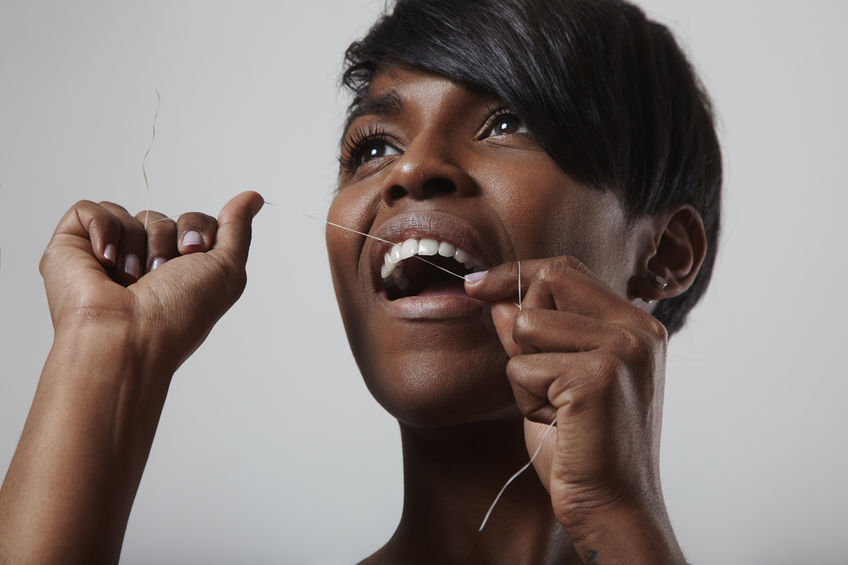
OK, no. It’s certainly true that flossing comes in handy when you have annoying food particles stuck between your teeth; however, that’s not the sole purpose of this dental care task. Flossing your teeth does help to remove hard-to-reach particles, germs, and plaque or tartar from spaces your toothbrush might not adequately reach. You should really floss your teeth at least once a day, and generally right before bed works best. That way your mouth is clean for sleep– no lurking cavity-causing food particles hanging around.
Wrong again, friends. It is important for children to also floss their teeth! For the same reasons it’s important for adults, children can also get food stuck between their teeth that if left behind, can cause decay or other issues. Younger children will need help with the task! Generally kids around age 6 or 7 can start handling the flossing on their own. Teach them the ways early to help build a foundation for healthy dental habits that will become long term.
Honestly, if flossing your teeth is causing you pain, you’ll need to get in touch with your Chattanooga dentist. Flossing might be uncomfortable if you’re not used to it or already in the habit of flossing your teeth regularly. If you have some minor discomfort, it’s probably because you have not been flossing as often as you should. Try to form the good habit of flossing daily, and the discomfort should subside. That said, pain is an indicator of a problem.
Flossing can be mildly awkward if you’re not accustomed to it, but it’s not difficult. It’s also something that takes next to no time at all once you get the technique right. The more you work it into your daily hygiene routine, the more adept you’ll become at accomplishing this critical task quickly. If you have a hard time reaching your very back molars, try Y-shaped floss picks or other interdental cleaners. In fact, interdental cleaners are great for cleaning properly around crowns and bridges, and generally hard-to-reach areas.
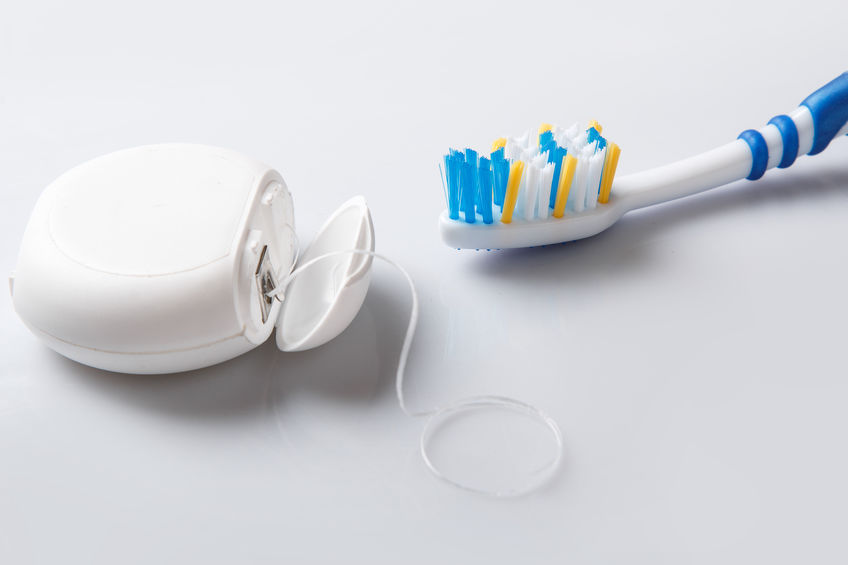
Wrong! There is a correct way to accomplish appropriate dental flossing, and if you’re not doing it correctly, you might be missing some food particles and plaque. Yikes! The most effective flossing method involves using roughly 18 inches of dental floss, winding it around the middle finger on each hand, and holding it between your thumbs and forefingers. Then you slide the floss up and down between two teeth, curving the floss around the top of each tooth, and gently flossing beneath the gumline to remove plaque, tartar, and left-behind food. When you move to clean between the next two teeth, shift the floss as well using a new area.
It’s important to make sure you have accurate information when it comes to your dental health. You’ve only got one set of permanent teeth, and it’s so critical to take every step to care for them well– from regular dental cleanings and exams to making healthy food and drink choices to brushing and proper flossing practices. We hope you found this list of overturned flossing myths informative and helpful. If you have questions or need to set up an appointment, get in touch with our Tedford Family Dentistry staff today! We’d love to help. P.S. Floss your teeth!